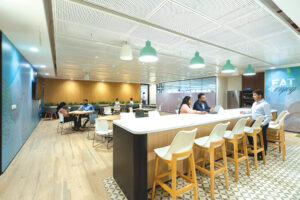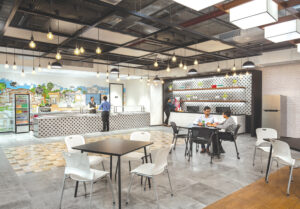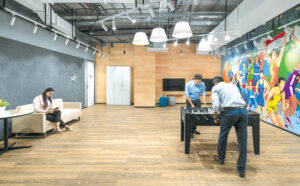We Take Pride In Having Worked On Projects In Several Major Cities Of India.
Abi Roni Mattom, Country Director, Unispace India How is the office market space picking up in the post-pandemic scenario? What are the key demand drivers? The dynamics of the office market space have significantly changed since the pandemic. The workspace today has developed into a tool that encourages innovation, improves employee engagement, and embodies the brand experience,

Abi Roni Mattom
Country Director, Unispace India
How is the office market space picking up in the post-pandemic scenario? What are the key demand drivers?
 The dynamics of the office market space have significantly changed since the pandemic. The workspace today has developed into a tool that encourages innovation, improves employee engagement, and embodies the brand experience, rather than just being an office to fit a given number of employees. In this post-pandemic scenario, a number of important demand drivers have emerged.
The dynamics of the office market space have significantly changed since the pandemic. The workspace today has developed into a tool that encourages innovation, improves employee engagement, and embodies the brand experience, rather than just being an office to fit a given number of employees. In this post-pandemic scenario, a number of important demand drivers have emerged.
First, there has been a noticeable shift towards hybrid work models that combine remote and in-office work. Demand for office spaces that encourage team-building, innovation, and collaboration is being driven by this newfound flexibility. To adapt to this shifting work environment, businesses are reevaluating their office layouts.
Secondly, the emphasis on technology in the workplace has grown since the post-pandemic era. To support seamless remote work and virtual meetings, advanced technology infrastructure and amenities are now actively demanded. In the modern hybrid work environment, cutting-edge workplace technologies that provide unbroken connectivity across physical boundaries are crucial.
Third, we are seeing a greater trend towards office decentralisation. To lessen employee concentration in a single location, some businesses have been considering decentralising their offices and setting up satellite or smaller offices in suburban areas or smaller cities. In some suburban markets, this might increase demand.
Fourth is a clear and distinct focus on connecting office design with sustainability and employee wellness. Tenants are likely drawn to environmentally friendly and wellness-certified buildings due to the pandemic as well as the incoming younger generation, who are aware of the significant effects that buildings have on their physical and mental well-being.
How has the post-pandemic hybrid work practices impacted the design works of new workplaces?
Modern workplace design is all about flexibility and functionality now. Instead of traditional cubicles, we’re seeing more open layouts with adaptable or modular spaces that can be easily reconfigured based on evolving needs. Technology integration has become super important too. Offices are wired up for seamless physical and virtual meetings, and there’s a big focus on ensuring everyone can work together effectively whether they’re in the office or working remotely. Also, we notice a lot more emphasis on wellness and sustainability, whether in terms of green spaces, better air quality, or ergonomic furniture. People want to feel good and be healthy at work. Post-pandemic, workplaces are all about being adaptable, tech-savvy, and healthy places to work.
What are the evolving design trends in office infrastructure spaces?
 The adoption of hybrid working methods has transformed workplace design for all organisations, including even large corporations, across numerous industries. The fixation on merely increasing headcount within the office premises has been relieved by this paradigm shift, which was once thought to be improbable. Instead, it has given clients the freedom to rethink workplaces with a strong sense of purpose.
The adoption of hybrid working methods has transformed workplace design for all organisations, including even large corporations, across numerous industries. The fixation on merely increasing headcount within the office premises has been relieved by this paradigm shift, which was once thought to be improbable. Instead, it has given clients the freedom to rethink workplaces with a strong sense of purpose.
The development of experiential spaces in office settings is one notable result of this change. Now you will find wellness areas, immersion rooms, and collaborative areas all included in these spaces, which go beyond traditional workstations. By reducing the gap between office workers and remote coworkers, they were purposefully designed to promote a sense of community and shared experience.
We’ve also noticed a trend where employers are giving their office spaces’ comfort top priority. In order to create a cozy atmosphere in particular office areas, this entails incorporating textures and finishes reminiscent of fine hospitality.
What are the latest design options and solutions offered by Unispace for Indian customers?
 At Unispace, we are at the forefront of designing innovative and experiential spaces, and clients who seek to create experiential spaces that break the mould of typical 9-5 work desk are engaging with us to create office spaces for them. In parallel, our commitment to providing cutting-edge design solutions for Indian customers has led us to create some truly exciting office spaces.
At Unispace, we are at the forefront of designing innovative and experiential spaces, and clients who seek to create experiential spaces that break the mould of typical 9-5 work desk are engaging with us to create office spaces for them. In parallel, our commitment to providing cutting-edge design solutions for Indian customers has led us to create some truly exciting office spaces.
For example, we recently designed the US-headquartered tax and accounting firm Withum’s office in Bangalore. The workspace features a large central collaboration area offering various work settings to promote space, connectivity and creativity, and providing an inviting environment for client sessions. The furniture throughout the space is flexible, allowing staff to easily move and adjust it to suit different functions. Conference rooms and enclosed offices are strategically placed at the core of the space to maximise natural light.
Another of them is the creation of a state-of-the-art workspace in Gurgaon for a leading global technology company. By expertly fusing functionality and aesthetics, their new office redefines the experiential workspace experience.
What are your expansion plans and growth initiatives for the Indian market?
Unispace’s growth strategy and expansion efforts in the Indian market are strategically aligned with the evolving needs of our clients and tap into the vast potential of this dynamic region. Currently, our operational footprint extends to studios in Bangalore and Mumbai, which have enabled us to serve a diverse portfolio of multinational clients. This presence in key cities has allowed us to develop a close understanding of local business dynamics while upholding global experience.
Recently, Unispace has started working with a tech firm in Pune to conceptualise and develop a large office space. Looking forward, our growth initiatives are directed towards further expanding our geographic presence within India. We are actively exploring emerging business hubs and metropolitan areas to offer tailored office design solutions that cater to the specific needs of our clients. We also take pride in having worked on projects in several major cities of India.







